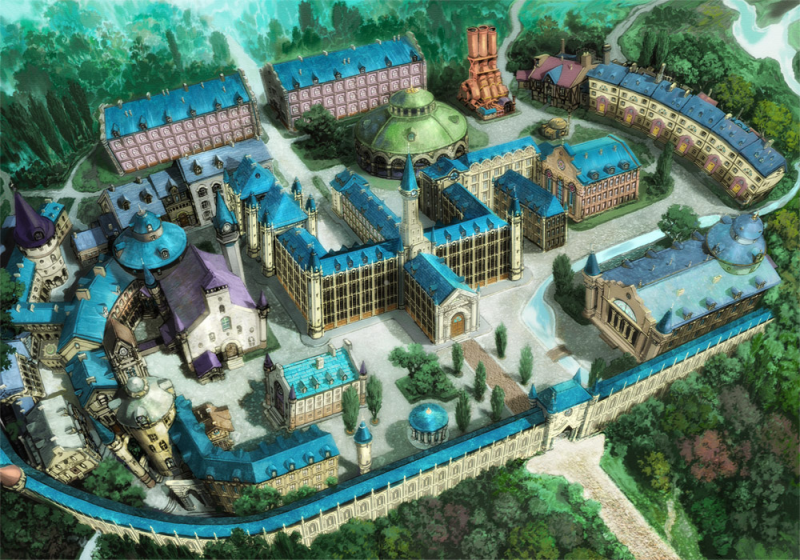School
Contents
School - Radiant Heart Academy
About Radiant Heart Academy
"Nurturing the lights of the future"
Radiant Heart Academy is a sprawling complex that sits in the center of the Four Wards area of Tokyo. A hybrid of private and public school, it serves the local communities and also a large population of students from elsewhere in the world who live in the dorms. A unique deal allowed the school's founders to build the complex as long as they also provided education to the communities nearby them, and that's how Radiant Heart Academy ended up as the cornerstone of all four wards.
Roughly 80% of Radiant Heart Academy's population come from the wards around it, native Tokyo citizens. The other 20% are invited specifically - and many families find their child may receive invites even if they themselves never sent off. Radiant Heart Academy asks no tuition from its resident students, and how the school manages to be as much as it is without that is a question debated by many and known by very few.
Most of RHA's classes and faculty are in Japanese, but over the summer months a series of classes meant to ease new students into the school and into speaking Japanese are held. It's said that Radiant Heart Academy's Japanese classes are some of the best in the world, and even students with otherwise poor language skills come out on the other end able to speak the local language quite well. Most students who live on campus are brought in during this time and thus begin the Japanese school year able to keep up with classmates.
RHA is an elevator school - meaning it serves students from elementary grades through to graduation of High School, and many students take college-level courses in their final years. Non-local students are generally invited to attend Radiant Heart Academy at early Junior High or later grades.
Students who graduate from Radiant Heart are notable for doing well, and the school has no shortage of luminaries in high positions of political and business worlds.
Students that are non-local reside in the dorms on campus during their time there; each dorm has a reasonable amount of space. Local students remain with their parents. Special arrangements can exist, however, which may see an otherwise local student residing in the dorms or a non-local student staying with a nearby family like an exchange program.
RHA's size and situation has caused small communities of shopping and entertainment to spring up around it - trendy clothes stores, candy shops, arcades, and more can be found not too far from any of its four entrances. Many teenage students take up part time jobs in the local community - both dorm-bound and local students - to get spending money.
While the faculty of Radiant Heart Academy truly do want to ensure they give the students the best education, there's another reason for the school's existence, known only to the upper echelons of the administration - which is partly made up of former Magical Girls and Magical Boys. Radiant Heart's true mission and purpose is to bring together those who have the potential to be warriors for the cause of good and give them the best chance, in the best place, to achieve that goal. These last few years, invites were sent to those who have that ability. RHA itself is situated on a ley line junction, and soon it will become part of the most active threats and magical energies... and the founders of RHA can only hope they've pulled the right students in to keep the world safe from the danger that it will very soon face.
Japanese School Quirks For Westerners
Unlike Western Schools, in Japanese schools the teachers move around from classroom to classroom. While sometimes you'll leave your homeroom (usually for science lab and home ec and gym) you don't really swap into 'other classes' - if someone's in your homeroom you'll see them in all your classes. If not, you won't! For higher grades occasionally there's some divergence in electives, but that doesn't really apply at middle school and below.
Schools across Japan don’t have a janitorial staff. Students spend 10-15 minutes cleaning the school at the end of the school day. Similarly, right before any vacation, they’ll spend 30 minutes to an hour cleaning.
Once your child becomes a student, you’ll likely notice that they’ll start spending much of their free time at school due to their club activities.
School club activities (bukatsu or 部活) are serious business in Japan. It’s a chance for students to create friendships and learn self-discipline, but they are known for taking up most students’ time. Students choose a club to join at the start of their first year, and they rarely change. Club activities happen all year round.
Grade System
This is a general guide to help folks place their general age around the grade. We use the American grading system here on Radiant Heart MUSH for ease of setting grades.
| Age | USA Grade | JPN Grade |
|---|---|---|
| 6-7 years old | Grade 1 | ELMN 1 |
| 7-8 years old | Grade 2 | ELMN 2 |
| 8-9 Years old | Grade 3 | ELMN 3 |
| 9-10 Years old | Grade 4 | ELMN 4 |
| 10-11 Years old | Grade 5 | ELMN 5 |
| 11-12 years old | Grade 6 | ELMN 6 |
| 12-13 years old | Grade 7 | JHS 1 |
| 13-14 Years old | Grade 8 | JHS 2 |
| 14-15 Years old | Grade 9 | JHS 3 |
| 15-16 Years old | Grade 10 | HS 1 |
| 16-17 Years old | Grade 11 | HS 2 |
| 17-18 Years old | Grade 12 | HS 3 |
Radiant Heart's Uniform Policy
Radiant Heart Academy, as an older school, has a uniform steeped in tradition, but has recently followed the way of a few more modern, progressive schools in Japan, mainly by allowing students to wear uniforms of their own design and accented with their own individuality, as long as it is a uniform. The school's own uniform however is- for girls: a light orange blouse, with blue accents and a blue skirt, and for boys: a black blazer with orange accents, with a light orange shirt, with blue slacks.


